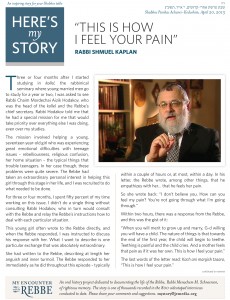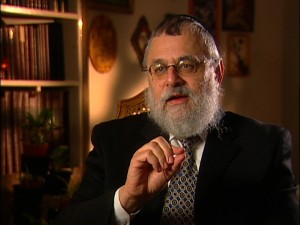HMS: “This is how I feel your pain”
Three or four months after I started studying in kollel, the rabbinical seminary where young married men go to study for a year or two, I was asked to see Rabbi Chaim Mordechai Aizik Hodakov, who was the head of the kollel and the Rebbe’s chief secretary. Rabbi Hodakov told me that he had a special mission for me that would take priority over everything else I was doing, even over my studies.
The mission involved helping a young, seventeen year-old girl who was experiencing great emotional difficulties with teenage issues – rebelliousness, religious confusion, her home situation – the typical things that trouble teenagers. In her case though, these problems were quite severe. The Rebbe had taken an extraordinary personal interest in helping this girl through this stage in her life, and I was recruited to do what needed to be done.
For three or four months, I spent fifty percent of my time working on this issue. I didn’t do a single thing without consulting Rabbi Hodakov, who in turn would consult with the Rebbe and relay the Rebbe’s instructions how to deal with each particular situation.
This young girl often wrote to the Rebbe directly, and when the Rebbe responded, I was instructed to discuss his response with her. What I want to describe is one particular exchange that was absolutely extraordinary.
She had written to the Rebbe, describing at length her anguish and inner turmoil. The Rebbe responded to her immediately as he did throughout this episode – typically within a couple of hours or, at most, within a day. In his letter, the Rebbe wrote, among other things, that he empathizes with her… that he feels her pain.
So she wrote back: “I don’t believe you. How can you feel my pain? You’re not going through what I’m going through.”
Within two hours, there was a response from the Rebbe, and this was the gist of it:
“When you will merit to grow up and marry, G-d willing you will have a child. The nature of things is that towards the end of the first year, the child will begin to teethe. Teething is painful and the child cries. And a mother feels that pain as if it was her own. This is how I feel your pain.”
The last words of the letter read: Kach ani margish tzaara, “This is how I feel your pain.”
This had a very strong impact on her. We discussed it and she began to realize that the Rebbe was feeling what she was going through, and that the Rebbe was trying to help her. Slowly, she began to respond. She made progress, she matured and things turned out well for her. Eventually she got married, had children and many good things happened to her.
I feel privileged to have witnessed firsthand the Rebbe’s involvement in this girl’s life… how he put himself into it with such intensity. I mean, he was the Rebbe, and yet he spent so much time answering her letters back and forth, back and forth, over weeks and months. And through his caring, he succeeded in turning her life around.
Rabbi Shmuel Kaplan is the head Chabad emissary in Maryland.
This week’s Here’s My Story is sponsored
in honor of our dear Rebbe
by
Rabbi Leib and Esther Lerner Rabbi Menachem and Faige Rosenblum







No Comments to “HMS: “This is how I feel your pain””